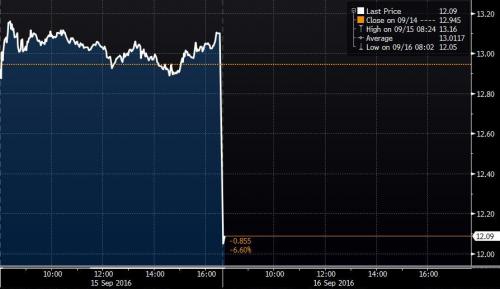As reported last night, things for Germany’s largest, and most troubled lender, Deutsche Bank went from bad to worse when just a few weeks after the EU slapped Apple with a $14 billion bill for “back taxes,” the U.S. Department of Justice responded in kind with a $14 billion fine of its own to Deutsche Bank to settle an outstanding probe into the company’s trading of mortgage-backed securities during the financial crisis. Making matters hostile, in a statement on Friday morning, the German bank’s CEO rejected the opening settlement claim and said that he “has no intent to settle these potential civil claims anywhere near the number cited”, adding that “the negotiations are only just beginning. The bank expects that they will lead to an outcome similar to those of peer banks which have settled at materially lower amounts.”
Maybe, but the market is not so sure, and after opening for trading minutes ago, Deutsche Bank stock tanked a whopping 8% on news of the DOJ’s $14 billion proposed settlement, once again approaching its all time lows.

Putting the settlement in context, BofA paid $17 billion to reach a settlement in a similar case in 2014, while Goldman agreed to a $5.1 billion settlement with the U.S. earlier this year, including a $2.4 billion civil penalty and $875 million in cash payments, to resolve U.S. allegations that it failed to properly vet mortgage-backed securities before selling them to investors as high-quality debt. The settlement included an admission of wrongdoing.
As Bloomberg reports, the bank confirmed that it had started negotiations with the Justice Department to settle civil claims. The $14 billion is considered an “opening bid†that could go “much lower,†according to the Wall Street Journal. On the other hand, in light of the recent European hostility involving AAPL shares, the DOJ may be unwilling to budge. Which is why the final settlement amount is now so critical: according to a JPM calculation, a settlement of about $2.4 billion “would be taken very positively,†and that an agreement exceeding $4 billion would pose questions about the bank’s capital positions and force it to “build additional litigation reserves.â€

